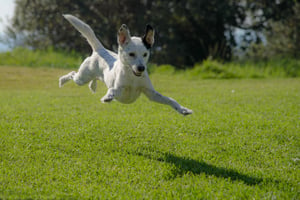If you've noticed your dog chewing fur off his tail, you're likely wondering why this is happening...
Dog Chewing Hair Off Tail: Causes, Symptoms, and Treatments
Dogs chewing hair off their tail is a common problem for pet owners. Not only is it distressing for the animal, but it can cause serious health issues if left untreated. In this article, we will discuss the causes, symptoms, and treatments for dog chewing hair off tail.
Causes of Dog Chewing Hair Off Tail
There are several potential causes of a dog chewing hair off its tail. The most common cause is boredom or stress. Dogs may chew their fur to relieve boredom or anxiety. Other potential causes include fleas, mites, allergies, or infections.
In some cases, the underlying cause of a dog chewing its fur off may be related to genetics. Some breeds, such as Chihuahuas and Bichon Frises, are predisposed to this behavior and may be more likely to chew their fur off than other breeds.
It is important to rule out any medical causes before assuming that boredom or stress is the cause of the problem. If your dog is chewing its fur off, it is best to take it to the vet for an examination.
Symptoms of Dog Chewing Hair Off Tail
The most obvious symptom of a dog chewing its fur off is the lack of fur on its tail. Other symptoms may include excessive itching or licking, red or inflamed skin, and bald patches or scabs on the skin.
If your dog is exhibiting any of these symptoms, it is important to take it to the vet for a checkup. The vet may be able to diagnose the underlying cause of the problem and provide treatment.
Treatments for Dog Chewing Hair Off Tail
The treatment for a dog chewing its fur off will depend on the underlying cause. If the cause is boredom or stress, the vet may recommend providing your dog with more mental stimulation or exercise. Taking your dog for daily walks, providing it with toys, or enrolling it in a dog training class can help reduce boredom and stress.
If the cause is fleas, mites, allergies, or infections, the vet may recommend a course of antibiotics, anti-parasitic medication, or steroids. The vet may also recommend treating the underlying cause of the problem, such as flea infestations or allergies.
In some cases, the vet may recommend a behavioral modification program to help your dog stop chewing its fur off. This may include providing your dog with positive reinforcement when it is not chewing its fur off, or using distraction techniques when it starts to chew its fur off.
It is important to consult your vet if your dog is exhibiting any of the symptoms of dog chewing hair off tail. The vet can help diagnose the underlying cause and provide treatment to help your dog stop chewing its fur off.
Preventing Dog Chewing Hair Off Tail
There are several ways to prevent your dog from chewing its fur off. The most important is to provide your dog with plenty of mental stimulation and exercise. Taking your dog for daily walks and providing it with toys can help reduce boredom and stress.
If your dog has an underlying medical condition that is causing it to chew its fur off, it is important to treat the condition as soon as possible. Flea infestations, mites, allergies, and infections should be treated with the appropriate medications.
You can also use distraction techniques when your dog starts to chew its fur off. Providing your dog with a chew toy or playing with it can help redirect its attention away from its fur.
Finally, it is important to keep your dog’s fur trimmed. This can help reduce the temptation to chew its fur off and can make it easier to spot any bald patches or scabs on the skin.
Conclusion
Dog chewing hair off tail is a common problem for pet owners. Not only is it distressing for the animal, but it can cause serious health issues if left untreated. The causes of dog chewing hair off tail can range from boredom or stress to fleas, mites, allergies, or infections.
The treatment for dog chewing hair off tail will depend on the underlying cause. If the cause is boredom or stress, the vet may recommend providing your dog with more mental stimulation or exercise. If the cause is fleas, mites, allergies, or infections, the vet may recommend a course of antibiotics, anti-parasitic medication, or steroids.
Preventing dog chewing hair off tail can be done by providing your dog with plenty of mental stimulation and exercise, treating any underlying medical conditions, and using distraction techniques when your dog starts to chew its fur off. Keeping your dog’s fur trimmed can also help reduce the temptation to chew its fur off.



